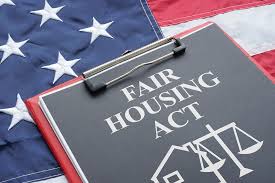
What Is the Fair Housing Act?
Definition and Examples of the Fair Housing Act. The Fair Housing Act was first passed into law in 1968 and has been regularly revised since. The United States Department of Housing and Urban Development (HUD) enforces it.
The Fair Housing Act prohibits lenders, landlords, sellers, and agents from discriminating against homebuyers and tenants based on specific characteristics like race, color, religion, sexual orientation, nationality disability status or family status. Thanks to this law it is unlawful for anyone who practices a different religion from yours from renting an apartment.
Individual states and local governments can add protections to existing law, but cannot take away. Temple University’s Beasley School of Law’s Policy Surveillance Program shows 49 states plus DC have already passed additional protection measures.
Note that certain states provide additional protections based on factors like ancestry, gender identity, source of income, military status and pregnancy.
Alternate Name: Title VIII of Civil Rights Act of 1968
How Does the Fair Housing Act Work? Under the Fair Housing Act, property owners cannot discriminate against people in protected classes. Furthermore, they cannot deny reasonable accommodation to people with disabilities who require it – such as making changes to policies and practices of a property that will allow their occupants to use and enjoy it more fully.
Doing so would compromise their rights as tenants. Nor can property owners stop tenants from making reasonable modifications at their own cost that allow them to use and enjoy the property more fully; these changes must not cause harm or be an undue financial or administrative burden on housing providers.
Enforcement of the Fair Housing Act
Since the Fair Housing Act is a federal law, HUD oversees its enforcement. If you believe you’ve been the victim of illegal housing discrimination, filing either a suit in state or federal court, or making a formal complaint directly with HUD may be an option for recourse.
If your complaint with a federal agency reveals reasonable cause to believe your rights were violated under the act, they will prepare charges of discrimination. Within 30 days you can decide between having it heard before either a HUD administrative court or federal court.
If you pursue the former path, HUD attorneys will represent your interests. This process typically goes faster than federal trials with judges or juries but only qualifies you for compensatory damages without punitive ones being awarded; with a federal trial represented by US Department of Justice attorneys however, both compensatory and punitive damages may be awarded by defendant.
Note that enforcement of the Fair Housing Act can be challenging due to non-overt forms of discrimination that cannot be documented easily. If you do have evidence of discrimination – recordings or written records for instance – contact an attorney or local fair housing agency as soon as possible for guidance and next steps. HUD will investigate when formal complaints are filed.
If HUD discovers any pattern or practice of discrimination against any group to such an extent that it poses a substantial public interest concern, they may refer the matter directly to DOJ, who could then file suit on behalf of victims against any defendants involved.
Penalties for Violating the Fair Housing Act
Civil penalties for violating the Fair Housing Act can range from $16,000 for first offenses up to and including $65,000 if two or more violations occurred in the last seven years. If taken to federal district court and won, defendants could also face actual, punitive and compensatory damages as well as legal fees as penalties for their violations of law.
Types of Discrimination
Are You Confused about what Afflictions Qualify as Discrimination under the Fair Housing Act? Here Are Some Examples to Help Guide Your Search :
An unfair practice where sellers refuse to work with prospective buyers because of their race or color or because they do not fit with the demographics of the neighborhood.
An apartment was advertised for rent but when they found out the tenant is LGBTQ-identified they informed him or her it had already been taken and told others about its availability instead.
One mortgage lender charges higher interest rates for individuals from foreign nationalities; two condominium complexes fail to comply with accessibility standards and therefore deny access for wheelchair-using tenants; both factors create obstacles for potential tenancy.
One landlord refuses to rent to a single mother with children; and one real estate agent directs a prospective homebuyer elsewhere when their religion does not correspond with that prevalent in their area.
What It Means for Your Family
The Fair Housing Act was intended to safeguard certain classes of people against discrimination when searching for or renting a place to live, however discrimination can still occur and it’s often not evident enough for an investigation to prove.
If you believe your rights have been violated by a landlord, lender, seller, or agent, try documenting all communication. That way if any discrimination arises you have something tangible to back your case up with.
If you believe your rights have been infringed upon, don’t hesitate to get in touch with the local fair housing agency or an attorney so they can advise on next steps.
Key Takeaways
The Fair Housing Act prohibits landlords, lenders, sellers, and agents from discriminating against prospective homebuyers or renters based on race, color, religion, sexual orientation, nationality, disability status or family status.
Many states have passed laws providing additional protected classes beyond what’s specified by the Fair Housing Act; however, these cannot overrule its provisions.
If you believe discrimination from a landlord, lender, seller or real estate agent has occurred, it is essential that communications be conducted in such a way as to permit records retention. Should your rights have been violated under the Fair Housing Act then legal action can be taken against those responsible.
